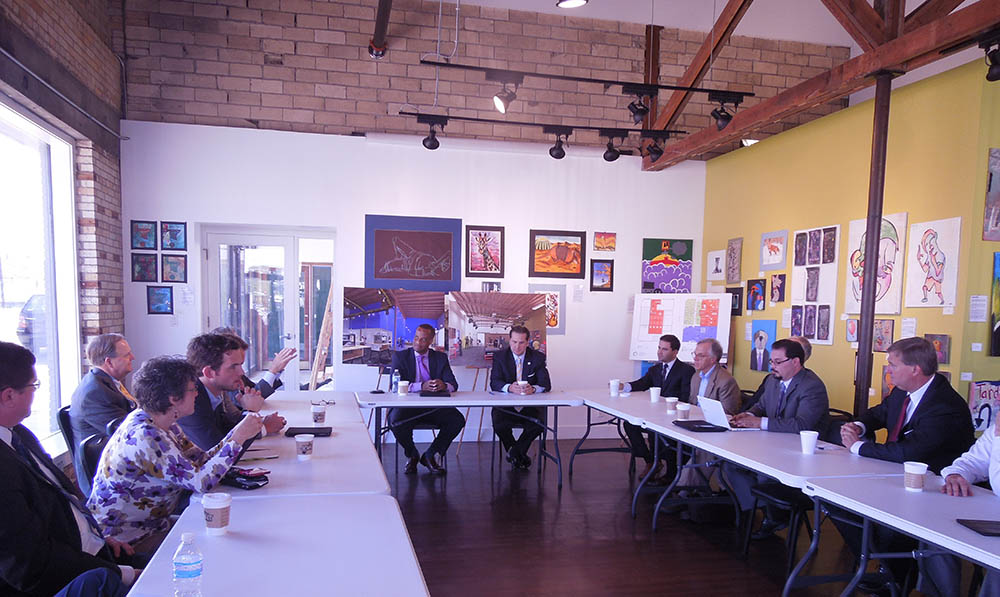Highlight: Rebuilding Youngstown and Communities Like It
February 2015 Newsletter
By Jay Williams
 |
|
Then Mayor Williams highlighting the growth in Youngstown, Ohio. |
By the time I took office as Youngstown’s mayor in 2006, the Youngstown Business Incubator (YBI) that had been established in the 1990s was driving huge change, but there was still work to be done. Through a combination of visioning, planning, public/private partnerships and investments, and most importantly a determined citizenry, my hometown of Youngstown, Ohio is redefining itself. Today, I am proud to say, that Youngstown is experiencing a renaissance, a renewal beyond what most would have thought possible.
The kind of renewal that Youngstown has experienced is the kind of work that EDA has been taking on for the past 50 years across the country. The Economic Development Administration has a vital role in facilitating the economic transformation of distressed communities. I’ve always held that jobs aren’t created by politicians or government agencies. However, government agencies such as EDA and others do play an important role in helping to shape the economic environment. The public sector also plays a crucial role in investing in infrastructure, promoting innovation, and encouraging regional cooperation, which likewise boosts private sector job creation. My experiences helping to redevelop Youngstown into the emerging town it is now have helped shape my leadership of the Economic Development Administration and have taught me valuable lessons that I carry with me in my current role.
The number one lesson I learned is that there is no silver bullet to economic growth – no miracle tactic that guarantees results for everyone. Instead, economic development requires that the public, private, and academic sectors work together. As EDA works with communities on their locally owned plans, we try to stress the importance of effective partnerships across the region.
Some of our most successful investments would not have been possible without the coordination and cooperation from all sectors in the community.
EDA and Commerce are taking this idea to the next level with the Investing in Manufacturing Communities Partnership (IMCP) initiative. IMCP encourages communities to develop partnerships that will drive comprehensive economic development strategies to strengthen their competitive edge for attracting global manufacturer and supply chain investments. Last May, 12 communities received “Manufacturing Community” designations, and EDA is launching a competition to designate up to 12 additional communities last week. The designated communities and those who applied to be designees are already seeing the benefits of increased collaboration in the form of grants, improved coordination, and expansion of their manufacturing sectors.

But more than just making sure the community is engaged, it’s crucial to ensure that it is the community that drives the change. A community cannot rely on elected officials who could get voted out of office in the next election to change things. The people of Baltimore didn’t wait for their elected officials to do something about the lack of available commercial kitchen space in Baltimore to fuel its emerging food economy. Instead, several community-based non-profits joined the Historic East Baltimore Community Action Coalition Inc. (HEBCA) to transform unused and abandoned buildings into the Baltimore Food Hub, a center of entrepreneurship and employment. Of course you still need the support of your elected officials – especially when it comes to making sure change is institutionalized. So, don’t fight City Hall, but don’t wait for it to take action either.
Lastly, remember that change doesn’t happen overnight – it takes time. Youngstown still has its challenges, and I am sure the same can be said for other communities working to recover from downturns and distress. You can’t give up on your community. As a member of the community and as mayor, I never gave up on Youngstown. At EDA we have countless examples of community members and leaders who never gave up on their hometowns, and we don’t give up on them either. EDA has been supporting economically distressed communities for the last 50 years, and we plan to be here for the next 50 as well.


